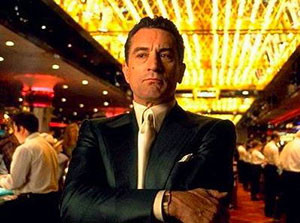 By The Mystic Gambler
By The Mystic Gambler
If you learn to think like the casino you can begin to turn the tables slightly to your advantage. Casinos are sophisticated businesses with one ultimate aim: To part you from your money. The more you know about how they do that, the more likely you are to keep more of yours. Just
The Edge
The games in a casino are designed to give the house a built-in advantage commonly called ‘the house edge’; stacking the odds in favor of the casino. It doesn’t matter what game you decide to play, the odds of the casino winning your money are greater than the odds of you winning from the casino. Every casino game is designed so that the probable payout to the players gives the casino a slight advantage. It is an assured percentage returned to the casino over time, and for you an assured percentage loss of what you bet.
As an example, let’s look at roulette. The highest payout for a single number bet is 36 to 1. But a closer look at the roulette wheel reveals that besides having the numbers 1 to 36, there’s also a 0 and sometimes a 00 as well. The actual odds are 37 to 1 or 38 to 1, not the 36 to 1 that is the most a player can win on a winning bet.
On the games with the lowest house edge, the smallest advantage, a casino might only be generating about a 1 to 2% profit. On other games, it may make profits of up to 15 to 25% or more.
So, if you were thinking like a casino, wouldn’t you want your visitors to play the games with the highest house edge? It follows that, as a player, you might want to play games that give the casino the lowest edge.
Some of the best games to play do require a certain amount of skill to reduce the house edge. Others give the illusion that a player’s decisions can affect it. The Wizard of Odds has computed an excellent list of the house edge for most casino games.
The Long Run
Casinos think in terms of millions. Millions of hands, millions of rolls, millions of pulls, etc. They understand that the advantage that they have will always prove itself in the long run.
As players, we have a tendency to think in much shorter terms. We see the ups and downs of a session, a winning or losing trip or hot and cold streaks. To the casino it’s all one big game and the longer it goes on the more their advantage is realized.
Short term, the casino actually returns most of what they take in back to the players. But it’s distributed in dribs and drabs with a few so-called jackpots in between. And only about 3% of the players leave with more money than what they started with. One of the reasons for that is simply, they don’t quit while they’re ahead.
This is why casinos want you to play as long as possible. And why smart gamblers set limits. Limits are predetermined by their bankrolls, winnings and a set amount of time to gamble. In the short run, anything can happen. You could win, break even or lose. But if you gamble long enough there is only one assured outcome.
Now That You Know
After reading the above, you can see that the house edge actually breaks down into two parts. Not only will the odds of any game always favor the casino but the casino depends on the long run for those odds to play out in their favor. As we now begin to think like the casino, a smart strategy becomes apparent for those that desire to get the most out of their gambling dollars: Play the games that have the best odds and limit your gambling time.
A related post on TheMysticGambler website discusses both points with the emphasis on managing a keno bankroll. It will be helpful in defending yourself against the house edge and adds more to understanding how, by thinking like the casino, we can win more often.

